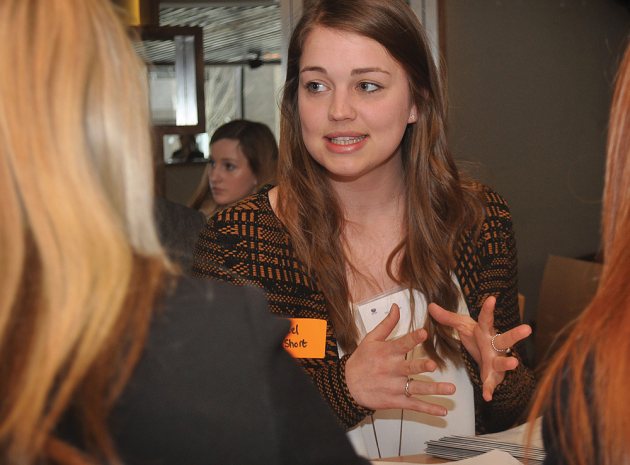Why aren’t more young women considering the apprenticeship route into a career in engineering or technology, asks Sarah Shaw…
In the UK today, government, employers and educators all acknowledge that there is a shortage of skilled technical professionals, with a projected requirement over the next six years for 830,000 scientists, engineers and technologists – that’s over 100,000 new professionals needed each year to 2020. Women are significantly under-represented in engineering and technology careers and if they continue to shun opportunities in this sector, the shortfall will be exacerbated and employers will struggle to fill vacancies with British talent for years to come. To address this skills shortage, we need to make the most of all our talents and that means encouraging more women to consider the choices that can lead to these exciting and rewarding career options.
Recent research of 18 to 34 year olds carried out by City & Guilds Group showed that young men are twice as likely to be encouraged to take a technical apprenticeship as young women. The difference between the advice men and women received was particularly notable in the construction industry, where only 0.6% of women were encouraged to make it their career compared to 12% of men. Yet there is no reason why women shouldn’t build successful careers in technical disciplines – and nor should the apprenticeship route to employment be summarily dismissed. The modern apprenticeship is very different from the traditional trade apprenticeship, offering wide benefits for young people.
Model behaviour
These opportunities were explored on Saturday 15th March at an interactive discovery workshop for girls, their parents and teachers. Organised jointly by WISE (Women in Science and Engineering), of which I am communications director, and Leeds College of Building, and hosted at the First Direct Arena, Leeds, the event was designed to engage and inspire young women to pursue apprenticeship opportunities in the built environment, construction and engineering sectors.
The workshop was inspired by a recent careers event held in Basildon where Samantha Cameron and Miriam Clegg acted as career role models for young women. We took over an area of the Arena and ran our own ‘speed dating’ event; each table was hosted by one or two role models and the girls, parents and teachers had the opportunity to meet young women currently working in technical roles. They heard first-hand what it’s like to be a mechanical design engineer, an environmental scientist, a bid co-ordinator and more. They could ask any burning questions and find out what route the role models took to get to where they are today.
Our role models came from different companies and represented a broad range of options. Some had started work as apprentices, others had been to university; some were still completing their education whilst others had been practising for sometime. “Meeting all the incredibly bright and enthusiastic students and challenging their perceptions was a real joy,” reported Janet Beckett, a building services consultant with Carbon Saver UK, who was one of them. “Women are woefully underrepresented in my field, HVAC (heating, ventilation and air conditioning) and building services design, at around 3%. I believe much of this is due to media stereotypes and lack of engagement with STEM in schools which really ought to begin at primary school. It is such a shame as women make great engineers! I would love to think that by acting as a role model with WISE I can begin to change those ideas and numbers. It is absolutely inspiring to me to think that my experience as a professional design Engineer in the construction industry could become an inspiration to others, especially young women.”
12,800 males started engineering apprenticeships compared to only 400 females, in 2013
Different pathways
The workshop also considered the benefits of following the apprenticeship path. Around half of the role models had started as apprentices and were able to challenge some of the preconceptions around apprenticeships. Amy Parker, a maintenance scheme producer with A-One, which maintains parts of the motorway network, listed the key pluses: apprentices start earning as soon as they start working, they do not need to worry about a student loan yet they are getting a qualification valued by employers. Once her training is complete, the apprentice has already got practical experience of the job and doesn’t have to learn ‘the rules of the site’. Brian Duffy, from Leeds College of Building, also emphasised the wide range of high quality job opportunities available to apprentices. In the construction sector alone, there are over 100 roles ranging from bricklayers and plumbers to design engineers and architects. The student can go in at any level and progress to any level according to her personal ambition, capabilities and lifestyle. The highest level of qualification is the equivalent of a University degree and is acknowledged as such by employers.
“A career in science and engineering offers amazing opportunities for anyone,” observed Harriet Burrows, Principal Consultant at AECOM, one of the senior role models, “although historically women have shied away from what is perceived to be a male dominated industry. It was tremendous to see so many keen, intelligent young women laying the foundations for a rewarding future by considering their choices at an early stage and asking questions enabling them to make an informed decision for their chosen pathway” The event was well attended, with 60 girls, ten parents and eight teachers from several local schools, including Rodillian Academy, Prince Henry’s Grammar School, Woodkirk Academy, Swallow Hill Community College and Notre Dame 6th Form College. The feedback was positive; one of the attendees commented how much she had enjoyed learning about an industry that she didn’t know about and how many opportunities there are, saying, “I will definitely look at an engineering apprenticeship or doing STEM subjects at A Level”.
WISE has been working for 30 years to support education and industry in the UK to attract more women and girls into rewarding and exciting STEM study and careers. Our mission is to push the presence of female employees from 13% across science, technology, engineering and mathematics to a critical mass of 30% by the year 2020. “We passionately believe that engaging school girls with maths and science, particularly physics, at an early age and opening their eyes to the wealth of opportunities that there are available is essential in order to drive towards our goal,” insists Director Helen Wollaston. “Key influencers such as teachers, siblings, peers and parents also need to be encouraged to support girls’ choices to pursue STEM subjects as a positive step forward, and not perpetuate outdated stereotypes of engineering only being a realistic option for boys.”
Why consider an apprenticeship?
- Entry level at GCSE or ‘A’ level
- No student loan
- Earning from day one
- Recognised qualification with practical experience
- No limit to career ambition For more information, visit apprenticeships.org.uk. This includes a link to current apprenticeship vacancies.
The numbers game
- Britain has the lowest percentage of female engineering professionals in Europe with less than 10% vs 30% in Cyprus, Bulgaria and Latvia.
- The UK will require 100,000 more professional scientists, engineers and technologists each year, from now till 2020.
- Girls are achieving equal or better grades than boys at GCSE level in most STEM subjects and those that do A-Levels get higher A*-C grades than boys.
The event was sponsored by major UK employers including A-One, Atkins, CECA, InCommunities and NG Bailey. For further information, or if you want to be part of future events visit the WISE website (wisecampaign.org.uk ) or Leeds College of Building website ( lcb.ac.uk)











Why aren’t more young women considering the apprenticeship route into a career in engineering or technology, asks Sarah Shaw…